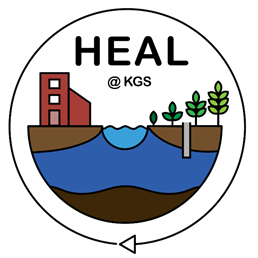How do water and land management decisions impact the people, economy, and environment of the Great Plains?
ecohydrology | hydrogeology | human-water interactions

How do water and land management decisions impact the people, economy, and environment of the Great Plains?
ecohydrology | hydrogeology | human-water interactions

The goal of the HydroEcology of the Anthropocene Lab (HEAL), led by Sam Zipper, is to understand how local, regional, and global change can and will affect the water resources of Kansas and the Great Plains region now and in the future. Our science will be useful, intelligible, and actionable for diverse stakeholders including water managers, policymakers, farmers, and conservation groups. In addition to our core Kansas-focused research program, we study how socio-environmental systems around the world experience and respond to similar water issues and connect these insights to local challenges. To accomplish this mission, we will collaborate with physical and social scientists around the world in addition to local stakeholders; openly share our methods, tools, and results; and continually move towards the intersection of scientific novelty and societal relevance.
We will accomplish this goal in an equitable and ethical manner. Please see the HEAL Values, Code of Conduct, and Expectations here.
Complete publication list here.
The HEAL group is focused on the question, How do water and land management decisions impact the people, economy, and environment of the Great Plains?
Methodologically, we use a combination of numerical/statistical modelling, field research, and remote sensing to quantify the movement of water and energy across the groundwater-vadose zone-stream-land surface continuum known as the ‘critical zone’, with a specialty in agricultural landscapes. We are deliberately transdisciplinary and link our technical ecohydrological research to improved understanding of human decision-making and management practices.
Here are some core topics we are currently working on. We have many varied interests, so please see our Publications for everything that doesn’t fit into one of these categories!
Transparency | Accessibility | Outreach
Science should be transparent and accessible to all, but 17% of scientific data ‘disappears’ per year due to inadequate data archiving. We actively participate in the Open Science movement through multiple avenues:
I’ve had the privilege to teach at the high school, undergraduate, and graduate levels. From this diverse experience, I’ve developed a learner-focused teaching style underlain by three core principles:
I use place-based teaching as the thread binding these three principles together. By using local examples, experiential field education, and real-world data, students build upon their sense of place to make connections between new material and their existing knowledge.
Courses Taught
Courses TA’ed
Other Teaching Experience
science, solutions, value
I work as a consultant on projects ranging from a handful of hours to multi-year collaborative projects. As an independent freelancer, I provide exceptional value to your project since my overhead costs are effectively zero - all you pay for is the time I spend doing science for you.
I’ve contributed to numerous projects, working with diverse groups including The Nature Conservancy, Foundry Spatial, the Environmental Defense Fund, Dairy Management Inc., and the Soil Health Institute.
My services include:
If you could benefit from any of these services, please send me an email and I’m happy to develop a scope of work that meets your needs and budget.